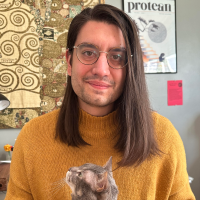
As the poetry editor of an explicitly left-wing magazine—one that publishes as much social critique as literature—submitters often ask me questions like: “Are these poems political enough for Protean?” It’s a question that haunts me in my editorial, scholarly, and creative work, largely because I’ve never been able to formulate a consistent definition of what good “political” poetry is.
Sometimes I know it when I see it. Last year, for example, we published two poems by Justin Davis that bitterly exhort the reader to “dip the poem in oil, occupy a country for it.” Or, more recently, Huda Fakhreddine’s translation of “I Grant You Refuge” by Heba Abu Nada, a Palestinian poet who was martyred in an Israeli airstrike. It’s impossible not to read these works as deeply politicized, whether by content or context. Other times, I’m struck by political indirectness, the way a poem renders social worlds atmospheric: a kind of dense, violent noise.
Honestly, though, maybe the whole question deserves to be flipped around. Instead of worrying about whether any particular poem is “political” enough, I’ve become equally concerned with the politics of my own editorial practices. What are their effects on the poems? Am I putting my own anti-capitalist, anti-racist, anti-imperialist commitments to good use when I accept, reject, solicit, or offer edits to the poets who are kind enough to send me their work? Ideally, my editorial practices would work as part of the poem’s conditions of production, just as poetry is an indispensable condition of Protean’s reproduction. Even for small magazines like us, there’s always going to be some degree of tension between radical poetic content and the realities of publishing. But we are all writing and editing in a time of ongoing political, economic, and—by extension—literary crises. If we want literature to respond (in all its inadequacy) to these catastrophes and struggles, then the people who select poems have as much responsibility as the ones who write them.
—Dominick Knowles, poetry editor, Protean
Photo credit: Rachel Dale







